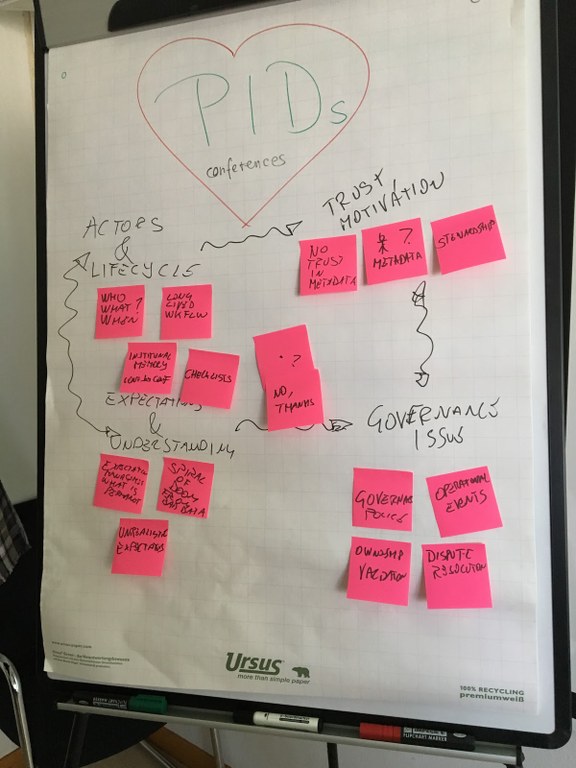Towards Persistent Identification of Conferences

Conference talks are a key element in scholarly communication. It is the primary mechanism for sharing research results and getting feedback. However, conferences in most disciplines never reached the same level of maturity as traditional journal publications in terms of quality management, which led to challenges like fraudulent conferences (see Beall's list of potentially fraudulent conferences). Conferences in computer science are a counter-example, as they publish full papers which undergo an often stricter peer-review process than the journal one. For instance, some top conferences get five reviews for each paper.
Taking into account such community specifics, there is need for a better control mechanism that can deliver credible information about conferences. A professional-sounding or even a familiar name does not guaranty integrity and there is no quality-approving certificate you can look for. What’s more, the “John Smith” problem is also applicable on conferences making conference name disambiguation essential. Indexing and abstracting services, conference publishers and conference management platforms follow their own procedures to disambiguate and check conferences for quality, but so far there has not been a uniform approach that could minimise the amount of effort going into this process.
Currently, the proposed solution to this challenge is establishing unique conference IDs. PIDs (persistent identifiers) enable persistent and unique identification of an object, even if the surrounding parameters change, thus tackling the name ambiguity problem by means of accompanying the PID with sufficient metadata.
Leading this effort is the Crossref/DataCite working group on PIDs for Conferences. The kick-off meeting for the technical implementation group was an important step towards the realisation of persistent identifiers for conferences and conference series. The meeting was hosted by CERN on February 27th. A variety of stakeholders were present at the meeting: publishers (Springer Nature, Elsevier, IEEE, The IET), research organisations, service providers (e.g., Dimensions, WoS, DBLP), PID providers, conference management platforms (Ex Ordo & Indico).
Participants defined use cases around conferences from the point of view of all the stakeholders concerned. Topics regarding the technical specification (e.g. metadata, governance, cost model, etc.) were also identified for later resolution/discussion. The working group has already produced a proposal for metadata for conferences and conference series.
A few examples of the user stories collected:
For an abstracting and indexing system:
- Disambiguate conferences with the same name and track all papers published in the proceedings.
- Compare various conferences in terms of impact, metrics, etc.
- Keep an authority file to record the fact that a conference existed, as a part of the audit trail of events related to a scientific discovery.
- Spot fake conferences.
For an academic organiser of conferences:
- Ensure all conference reviewers, PC members get recognition for their service, e.g., via ORCID.
- Trace all papers published in the proceedings.
- Inform the community well in advance about the conference, planned location, publisher (if applicable), etc.
- Compare my conference to other conferences in terms of impact, metrics, etc.
For an entity (society, company) organising the conference:
- Increase visibility of the upcoming conferences.
- Spot fake conferences.
- Attract authors, papers, attention (before the conference, after the fact).
For a publisher of the conference:
- Improve the discovery of conference proceedings through PID services.
- Link papers and conferences from the same conference series.
- Increase visibility of upcoming conferences.
- Spot fake conferences.
For a data consumer:
- PIDs for conferences, conference series, linked to proceedings, conference papers, ...
- Deal with metadata evolution as new information about a conference becomes available.
- Able to make decision on quality of event/series.
Now it’s about starting a pilot and figuring out how many of the user stories currently out there can be addressed by conference PIDs. While there are still many questions that need to be addressed, the workshop was an important step towards making conference PIDs a reality.
Read more:
https://www.crossref.org/blog/taking-the-con-out-of-conferences/
https://blog.datacite.org/pids-for-conferences/